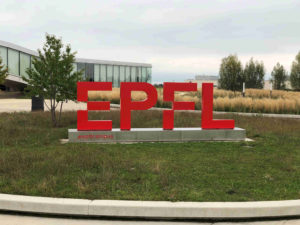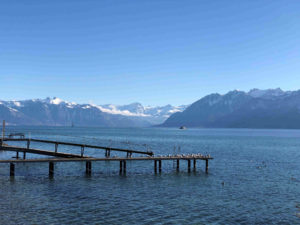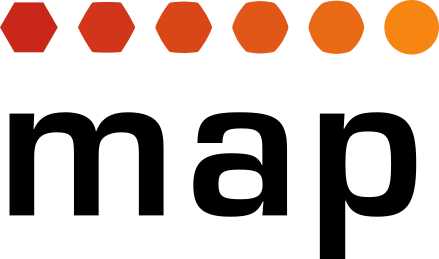MAP Master thesis at EPFL, Switzerland
Research on polymeric coatings to inactivate different viruses upon contact
Quite early in my Master studies, I became aware that I want to go abroad for preparing my Master thesis since I had already finished my Bachelor’s at FAU. Therefore, I started at the beginning of the second year of MAP to organize such a research stay for my thesis. After having to reject an invitation to Harvard University due to the COVID-19 pandemic, I was gratefully invited to the Supramolecular Nano-Materials and Interfaces Laboratory (SuNMIL) at École polytechnique fédérale de Lausanne (EPFL) by its head Prof. Francesco Stellacci under the supervision of Prof. Dr. Marcus Halik at FAU.

From October 2020 until the end of April 2021 I moved to Lausanne to follow this invitation. I found Lausanne as a wonderful city at Lake Geneva with view at the close alps. Living a bit off from the city center, I had the opportunity to explore the lake and enjoy the scenery every morning when cycling to campus. EPFL presented itself to me as a very modern and well organized university with cutting edge laboratories, especially in the context of materials science.

During my time at SuNMIL we researched on polymeric coatings with the aim to inactivate different viruses upon contact. Next to the spread via aerosols, which is on everybody’s lips these days, the transmission of viruses via inanimate surfaces, so-called fomites, is also possible. Therefore, long molecules with receptor-inspired functional groups were grown from surfaces via a sophisticated polymerization technique. This allows for the synthesis of very defined polymeric coatings with strong anchorage. For example, upon interaction the COVID-19 pandemic causing virus (SARS-CoV-2) could be inactivated by more than 99.9 % in 75 min. The coatings are believed to be a potentially strong platform for combating the spread of viral diseases via fomites in the future.
Overall, I am grateful for all the people I met and friends I found that made it a truly lasting experience for me. Furthermore, I am beyond happy having had the opportunity to take such an endeavor during a global pandemic.
In the end, I want to thank the organizational team of MAP and the Elite Network of Bavaria for having financially supported this stay as well as Prof. Stellacci and Prof. Dr. Halik for making this whole trip possible.
By Lukas Müller, MAP 2018 batch

